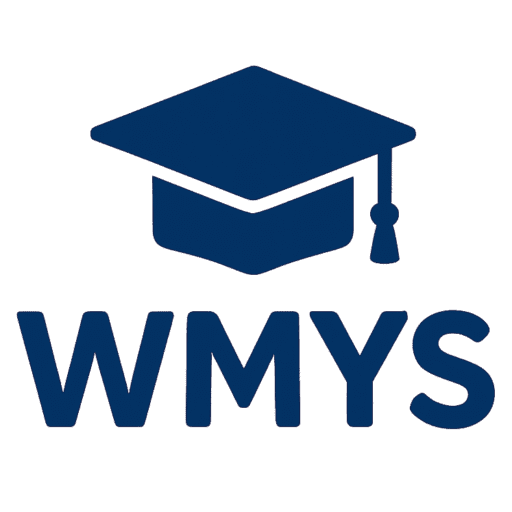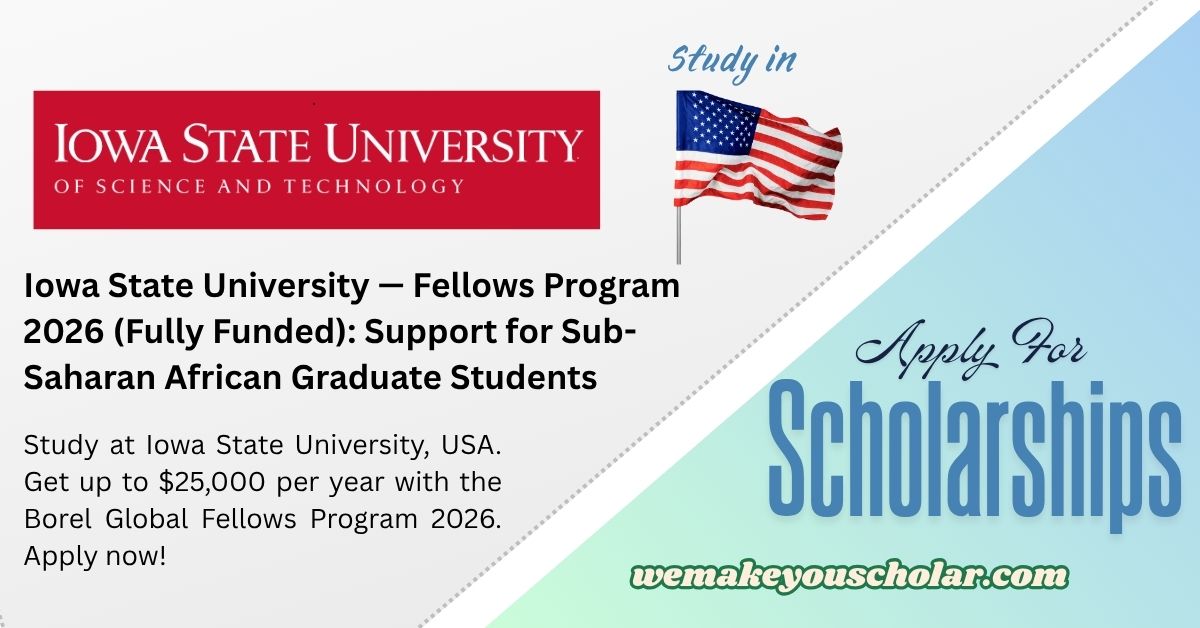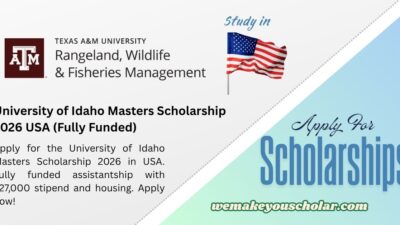Iowa State University — Borel Global Fellows Program 2026 (Fully Funded): Support for Sub-Saharan African Graduate Students
Short summary: The Borel Global Fellows Program at Iowa State University (ISU) funds graduate students from Sub-Saharan Africa to pursue MS and PhD degrees in the College of Agriculture and Life Sciences. Awardees receive up to $25,000 per year for stipends and research support, travel funding for research visits, and the opportunity to complete major research in Sub-Saharan Africa and then bring their expertise back to work and live in the region.
Why this fellowship matters
Across Sub-Saharan Africa, smallholder farmers feed communities but struggle with climate risk, pests, and limited access to research-driven agronomy. The Borel Global Fellows Program is a focused investment: it trains regional scientists who return home equipped with practical research, development strategies, and policy understanding to transform food security systems. For a student passionate about applied agricultural science with an impact-driven career, this fellowship removes financial barriers and links you directly to world-class research resources at ISU.
Program summary & key facts
Purpose
The Borel Global Fellows Program finances graduate students whose research and future careers are committed to strengthening food and nutrition security in Sub-Saharan Africa. The program emphasizes research completed largely in Sub-Saharan Africa and intentions to return and work in the region.
Who funds it
Generous gift from ISU alumni Jim (’78 Agricultural Business) and Marcia (’78 Family Environment) Borel. The program began in 2018 and is administered through ISU’s College of Agriculture and Life Sciences and the Office for Global Engagement / Center for Sustainable Rural Livelihoods (CSRL).
Key facts (at-a-glance)
- Eligible applicants: Citizens of Sub-Saharan African countries who are accepted into a graduate program (MS or PhD) in ISU’s College of Agriculture and Life Sciences.
- Funding: Up to $25,000 per year for stipends or a combination of stipend + research support.
- Duration: Up to 30 months (MS) and up to 42 months (PhD).
- Travel support: Funding available for research-related travel to/from Africa.
- Application submission: Applications must be submitted by ISU faculty (major professor); students cannot apply directly.
- Annual deadline: January 15 (applications due each year).
Eligibility criteria — who can apply
To be considered for the Borel Global Fellows Program, applicants must meet all of the following:
- Be a citizen of a Sub-Saharan African country.
- Be admitted to a graduate program (MS or PhD) in the College of Agriculture and Life Sciences at Iowa State University.
- Commit to completing graduate studies as preparation for a career contributing to food security and agricultural development in Sub-Saharan Africa.
- Plan to complete the majority of graduate research in Sub-Saharan Africa (research trips back to Africa, fieldwork, partnerships with African institutions).
- Demonstrate clear intention to work and live in Sub-Saharan Africa after graduation.
- Applications must be submitted by ISU faculty (major professor) requesting partial funding for an already-admitted graduate student.
Benefits, funding amount & duration
Stipend & research allowances
The Borel Global Fellows Program provides up to $25,000 per year for each student. This funding may be used for graduate student stipends, or split between stipend and research expenses. Typical uses include living stipend, research assistants, fieldwork costs, lab supplies, and small equipment needed for field research.
Duration by program level
- MS (Master’s): Funding is typically available for up to 30 months.
- PhD: Funding is possible for up to 42 months.
Travel support
Funding may include support for travel between the U.S. and Africa when travel is required for research or data collection in Sub-Saharan Africa. Request travel funding in your faculty sponsor’s cover letter and justify exactly how travel supports your research plan.
Required documents — what to prepare
Faculty submit applications on behalf of accepted students. A completed application package typically contains:
- Cover letter from the major professor (ISU faculty) — explains financial commitment from the professor/department (tuition, fees, research costs not covered by Borel funds) and confirms support for research in Sub-Saharan Africa.
- Student CV — clear, academic CV highlighting research experience, publications (if any), fieldwork, and relevant skills.
- Student goal statement / research statement — explains proposed research, the plan to conduct research mainly in Sub-Saharan Africa, relevance to regional food security, and career intentions after degree completion.
- Any additional departmental forms requested by the College of Agriculture and Life Sciences.
How to apply — step-by-step guide
Follow these steps precisely to make a clean, competitive application:
Step 1 — Get admitted to ISU (College of Agriculture & Life Sciences)
First, secure admission to a graduate program (MS or PhD) within the ISU College of Agriculture & Life Sciences. The Borel funding is only available for students already admitted to those programs. Start this process early — admissions can take several months.
Step 2 — Identify a prospective major professor at ISU
Find a faculty member whose research aligns with your goals and who is willing to sponsor you. The faculty sponsor must submit the Borel application and provide a cover letter describing commitments to tuition, fees, and research support that are not covered by the Borel award.
Step 3 — Draft your research and goal statements
Create a concise but persuasive goal statement that:
- Explains the research problem and objectives.
- Notes how and why the research will be carried out largely in Sub-Saharan Africa.
- Shows the expected impact on food security or livelihoods.
- Clarifies your post-degree intentions to live and work in Africa.
Step 4 — Prepare CV and supplemental materials
Provide an academic CV with clear headings: education, research experience, publications, presentations, fieldwork, technical skills, and relevant awards. Emphasize any prior experience working in Africa or with smallholder farming systems.
Step 5 — Faculty submits application before deadline (Jan 15)
Your faculty sponsor compiles the cover letter, your CV, and goal statement and submits the application to the ISU offices administering the Borel program (follow the instructions on the CSRL / ISU Borel program page). Applications are accepted annually; make sure the sponsoring faculty understands the internal submission route and deadlines.
Step 6 — Follow up and prepare for interviews (if any)
After submission, maintain communication with your faculty sponsor. ISU may request additional details or interviews. Be ready to provide clarifications about travel plans, research budget, and short-term milestones for your project.
Tips to make your application competitive
These practical tips increase clarity and show commitment:
- Be specific about research locations: name regions, partner institutions in Africa, or field sites and show prior contacts or MOUs if possible.
- Show a realistic budget: detail how Borel funds will be spent and what remaining costs the department or major professor will cover.
- Emphasize capacity building: note how your research will train local staff, strengthen institutional partnerships, or create sustainable tools or extension services for farmers.
- Evidence of community engagement: if you have prior experience in the region, include references from local collaborators or descriptions of prior fieldwork.
- Career commitment statement: a clear paragraph that explains why you will return to Africa and how your degree contributes to a career of regional impact.
FAQs — quick answers
Q: Can students apply directly?
A: No. Applications must be submitted by ISU faculty (major professor) for students already admitted into an ISU graduate program in the College of Agriculture and Life Sciences.
Q: Is the program open to applicants from outside Sub-Saharan Africa?
A: The Borel Global Fellows Program specifically supports students from Sub-Saharan African countries. Confirm your country’s eligibility with the program administrators.
Q: Are tuition and fees covered by the Borel award?
A: The Borel award is intended for stipends and research support. Tuition and fees are typically covered by the major professor/department or other funding commitments. The faculty cover letter should describe who covers what costs.
Q: Do I need IELTS/TOEFL?
A: Admission language requirements for ISU vary by program. For many programs, international applicants must demonstrate English proficiency (unless exempt). The Borel program itself does not waive admission requirements; check the graduate program page for language rules.
Q: What should my goal statement include?
A: Explain your research objectives, methods, planned fieldwork in Africa, expected outcomes on food security, and your plan to return to work in Africa after graduation.
Official link & contact
Official program page (Iowa State University — Center for Sustainable Rural Livelihoods / Borel Global Fellows): https://csrl.cals.iastate.edu/borel-global-fellows-program
If you are an ISU faculty member interested in submitting an application, contact the Office for Global Engagement or the Center for Sustainable Rural Livelihoods at ISU for the correct internal submission procedure and forms.
Internal resources & related scholarships (recommended reads)
Erasmus Mundus IMFSE Master Scholarship 2026 (Fully Funded in Europe)
Murphy International Fellowship Notre Dame Law 2025-26 | Law & Religion Support
Final words — should you apply?
If your career plan is to work on food security, agricultural development, or poverty alleviation in Sub-Saharan Africa, and you already have (or expect to secure) admission to an ISU graduate program in the College of Agriculture and Life Sciences, this is an excellent opportunity. The Borel Global Fellows Program removes financial barriers and intentionally builds African research capacity — a powerful springboard for a career focused on regional impact.
Need help preparing your application?
If you want, we can help you draft or polish your CV, goal statement, or faculty cover letter to increase your chances. Wemakeyouscholar offers editing and review services tailored to scholarship applications — reply to this post or contact us at co*****@**************ar.com.




